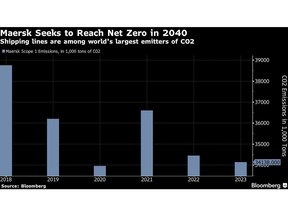Shipping giant AP Moller-Maersk A/S has struck a long-term supply deal for clean biomethanol from a Chinese facility, the latest iteration in its search for low-emission marine fuels.

Article content
(Bloomberg) — Shipping giant A.P. Moller-Maersk A/S has struck a long-term supply deal for clean biomethanol from a Chinese facility, the latest iteration in its search for low-emission marine fuels.
The container carrier will receive biomethanol made from waste – including cuttings of fruit trees – at a production facility in Xuchang, China, as part of a deal with Longi Green Energy Technology Co. Supply will begin in 2026, with full production expected by the end of the decade.
Advertisement 2
Article content
“Everyone involved in the energy transition in the shipping industry agrees that the essence is access to fuel,” said Morten Bo Christiansen, Head of Energy Transition at Maersk. “There are a lot of ships on the way that can burn alternative fuels.”
The shipping industry remains largely dependent on oil and pumps hundreds of millions of tons of greenhouse gas emissions into the atmosphere every year. Biofuels, including biomethanol, are part of a group of alternative fuels that have the potential to significantly reduce pollution from industry.
SEE ALSO: How an oil-guzzling shipping company is trying to clean it up: QuickTake
Maersk’s agreement with LONGi follows a previous agreement with Chinese developer Gold Wind, for an annual supply of 500,000 tons of green methanol. This latest deal will bring Maersk closer to 750,000 tons of supplies, Christiansen said in response to questions about the size of the supply. Maersk had initially planned to provide this level of green methanol supply by 2025, but the timeline has now been pushed back a few years, according to Christiansen.
Advertisement 3
Article content
“When we set this goal, we were more optimistic about what the market could offer us,” Christiansen said. “But things didn’t go quite as we expected.”
Volume still represents only a small portion of Maersk’s overall fuel consumption. In the second quarter of this year alone, the company consumed nearly three million tons of bunker fuel.
The biomethanol supplied by Longi will meet Maersk’s methanol sustainability requirements, including at least 65% reductions in greenhouse gas emissions on a life cycle basis compared to fossil fuels.
See also: Maersk changes its approach to dealing with LNG through a large shipping order (1)
Maersk has seven operational vessels capable of running on either methanol or petroleum-derived marine fuel, and has plans for more. The company’s combined green methanol offtake agreements now meet more than half of the projected demand from its dual-fuel methanol fleet in 2027.
The company also recently ordered ships capable of running on LNG.
-With assistance from Christian Feinberg.
Article content


Comments are closed, but trackbacks and pingbacks are open.